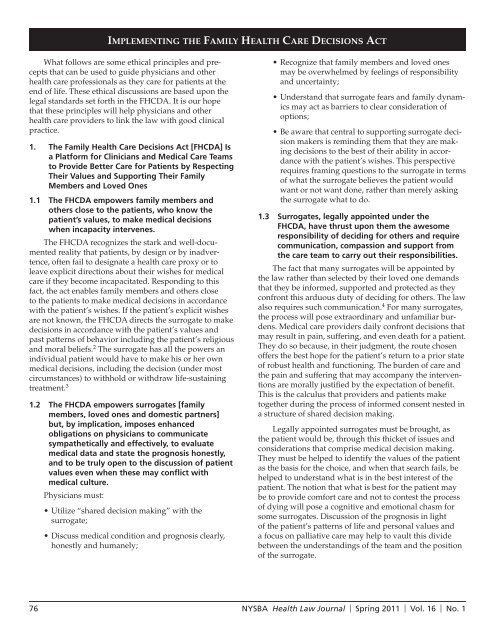Ethics and Clinical Practice Guided by the Family Health Care ...
Ethics and Clinical Practice Guided by the Family Health Care ...
Ethics and Clinical Practice Guided by the Family Health Care ...
You also want an ePaper? Increase the reach of your titles
YUMPU automatically turns print PDFs into web optimized ePapers that Google loves.
IMPLEMENTING THE FAMILY HEALTH CARE DECISIONS ACT<br />
What follows are some ethical principles <strong>and</strong> precepts<br />
that can be used to guide physicians <strong>and</strong> o<strong>the</strong>r<br />
health care professionals as <strong>the</strong>y care for patients at <strong>the</strong><br />
end of life. These ethical discussions are based upon <strong>the</strong><br />
legal st<strong>and</strong>ards set forth in <strong>the</strong> FHCDA. It is our hope<br />
that <strong>the</strong>se principles will help physicians <strong>and</strong> o<strong>the</strong>r<br />
health care providers to link <strong>the</strong> law with good clinical<br />
practice.<br />
1. The <strong>Family</strong> <strong>Health</strong> <strong>Care</strong> Decisions Act [FHCDA] Is<br />
a Platform for Clinicians <strong>and</strong> Medical <strong>Care</strong> Teams<br />
to Provide Better <strong>Care</strong> for Patients <strong>by</strong> Respecting<br />
Their Values <strong>and</strong> Supporting Their <strong>Family</strong><br />
Members <strong>and</strong> Loved Ones<br />
1.1 The FHCDA empowers family members <strong>and</strong><br />
o<strong>the</strong>rs close to <strong>the</strong> patients, who know <strong>the</strong><br />
patient’s values, to make medical decisions<br />
when incapacity intervenes.<br />
The FHCDA recognizes <strong>the</strong> stark <strong>and</strong> well-documented<br />
reality that patients, <strong>by</strong> design or <strong>by</strong> inadvertence,<br />
often fail to designate a health care proxy or to<br />
leave explicit directions about <strong>the</strong>ir wishes for medical<br />
care if <strong>the</strong>y become incapacitated. Responding to this<br />
fact, <strong>the</strong> act enables family members <strong>and</strong> o<strong>the</strong>rs close<br />
to <strong>the</strong> patients to make medical decisions in accordance<br />
with <strong>the</strong> patient’s wishes. If <strong>the</strong> patient’s explicit wishes<br />
are not known, <strong>the</strong> FHCDA directs <strong>the</strong> surrogate to make<br />
decisions in accordance with <strong>the</strong> patient’s values <strong>and</strong><br />
past patterns of behavior including <strong>the</strong> patient’s religious<br />
<strong>and</strong> moral beliefs. 2 The surrogate has all <strong>the</strong> powers an<br />
individual patient would have to make his or her own<br />
medical decisions, including <strong>the</strong> decision (under most<br />
circumstances) to withhold or withdraw life-sustaining<br />
treatment. 3<br />
1.2 The FHCDA empowers surrogates [family<br />
members, loved ones <strong>and</strong> domestic partners]<br />
but, <strong>by</strong> implication, imposes enhanced<br />
obligations on physicians to communicate<br />
sympa<strong>the</strong>tically <strong>and</strong> effectively, to evaluate<br />
medical data <strong>and</strong> state <strong>the</strong> prognosis honestly,<br />
<strong>and</strong> to be truly open to <strong>the</strong> discussion of patient<br />
values even when <strong>the</strong>se may conflict with<br />
medical culture.<br />
Physicians must:<br />
• Utilize “shared decision making” with <strong>the</strong><br />
surrogate;<br />
• Discuss medical condition <strong>and</strong> prognosis clearly,<br />
honestly <strong>and</strong> humanely;<br />
• Recognize that family members <strong>and</strong> loved ones<br />
may be overwhelmed <strong>by</strong> feelings of responsibility<br />
<strong>and</strong> uncertainty;<br />
• Underst<strong>and</strong> that surrogate fears <strong>and</strong> family dynamics<br />
may act as barriers to clear consideration of<br />
options;<br />
• Be aware that central to supporting surrogate decision<br />
makers is reminding <strong>the</strong>m that <strong>the</strong>y are making<br />
decisions to <strong>the</strong> best of <strong>the</strong>ir ability in accordance<br />
with <strong>the</strong> patient’s wishes. This perspective<br />
requires framing questions to <strong>the</strong> surrogate in terms<br />
of what <strong>the</strong> surrogate believes <strong>the</strong> patient would<br />
want or not want done, ra<strong>the</strong>r than merely asking<br />
<strong>the</strong> surrogate what to do.<br />
1.3 Surrogates, legally appointed under <strong>the</strong><br />
FHCDA, have thrust upon <strong>the</strong>m <strong>the</strong> awesome<br />
responsibility of deciding for o<strong>the</strong>rs <strong>and</strong> require<br />
communication, compassion <strong>and</strong> support from<br />
<strong>the</strong> care team to carry out <strong>the</strong>ir responsibilities.<br />
The fact that many surrogates will be appointed <strong>by</strong><br />
<strong>the</strong> law ra<strong>the</strong>r than selected <strong>by</strong> <strong>the</strong>ir loved one dem<strong>and</strong>s<br />
that <strong>the</strong>y be informed, supported <strong>and</strong> protected as <strong>the</strong>y<br />
confront this arduous duty of deciding for o<strong>the</strong>rs. The law<br />
also requires such communication. 4 For many surrogates,<br />
<strong>the</strong> process will pose extraordinary <strong>and</strong> unfamiliar burdens.<br />
Medical care providers daily confront decisions that<br />
may result in pain, suffering, <strong>and</strong> even death for a patient.<br />
They do so because, in <strong>the</strong>ir judgment, <strong>the</strong> route chosen<br />
offers <strong>the</strong> best hope for <strong>the</strong> patient’s return to a prior state<br />
of robust health <strong>and</strong> functioning. The burden of care <strong>and</strong><br />
<strong>the</strong> pain <strong>and</strong> suffering that may accompany <strong>the</strong> interventions<br />
are morally justified <strong>by</strong> <strong>the</strong> expectation of benefit.<br />
This is <strong>the</strong> calculus that providers <strong>and</strong> patients make<br />
toge<strong>the</strong>r during <strong>the</strong> process of informed consent nested in<br />
a structure of shared decision making.<br />
Legally appointed surrogates must be brought, as<br />
<strong>the</strong> patient would be, through this thicket of issues <strong>and</strong><br />
considerations that comprise medical decision making.<br />
They must be helped to identify <strong>the</strong> values of <strong>the</strong> patient<br />
as <strong>the</strong> basis for <strong>the</strong> choice, <strong>and</strong> when that search fails, be<br />
helped to underst<strong>and</strong> what is in <strong>the</strong> best interest of <strong>the</strong><br />
patient. The notion that what is best for <strong>the</strong> patient may<br />
be to provide comfort care <strong>and</strong> not to contest <strong>the</strong> process<br />
of dying will pose a cognitive <strong>and</strong> emotional chasm for<br />
some surrogates. Discussion of <strong>the</strong> prognosis in light<br />
of <strong>the</strong> patient’s patterns of life <strong>and</strong> personal values <strong>and</strong><br />
a focus on palliative care may help to vault this divide<br />
between <strong>the</strong> underst<strong>and</strong>ings of <strong>the</strong> team <strong>and</strong> <strong>the</strong> position<br />
of <strong>the</strong> surrogate.<br />
76 NYSBA <strong>Health</strong> Law Journal | Spring 2011 | Vol. 16 | No. 1



